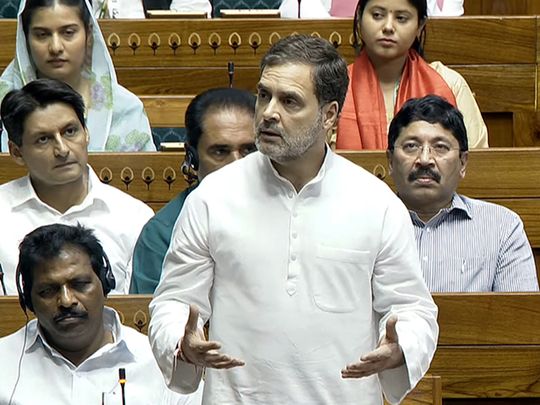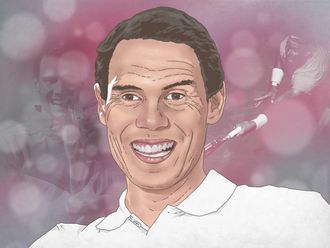
Until Rahul Gandhi made his debut speech in Parliament as Leader of the Opposition, the big national issue in India was the bungling of the medical school entrance exams. Youth across India were aghast at the allegations of question papers being sold in advance, irregularities in awarding marks, and cheating at exam centres.
The National Eligibility cum Entrance Test or NEET was the big issue the opposition was expected to corner the government with, right at the beginning of PM Modi’s third term.
Rahul Gandhi spent the first 30 minutes of his 90-minute long speech talking about religion, making remarks that left enough room for the ruling Bhartiya Janata Party to creatively misinterpret and target Rahul Gandhi as anti-Hindu. We can now keep debating what Rahul Gandhi said and did not say, in the process taking attention away from NEET.
Yes, Rahul Gandhi did talk about NEET — at the fag end of his speech. Usually people begin with their strongest point, leaving out their weak points. Religion is a weak point as far as the Congress party is concerned. The BJP has owned Hindu nationalism. Why would Rahul Gandhi want to play on the BJP’s pitch when he was gifted with a great pitch to play on, the NEET issue?
Good Hindu, Bad Hindu
It is therefore strange to see liberal commentators go into a paroxysm of joy over Rahul Gandhi’s NEET self-goal. Rahul Gandhi is reclaiming Hinduism from the BJP, they say. They point out how Rahul Gandhi emphatically made the point that PM Modi, his party the BJP, and parent organisation RSS do not represent all Hindus.
But even if Rahul Gandhi were to win this argument, would it help him win votes?
The 2024 Lok Sabha election results have shown the limits of the use of religion in politics. The BJP was banking on a Hindutva wave after the inauguration of the Ram temple in Ayodhya. Fluorescent saffron flags were put up in every nook and corner of the country for months. The BJP’s vote share and seats actually declined. The greatest shock was in Uttar Pradesh, where Hindutva has historically worked the most.
The BJP lost even the Faizabad Lok Sabha seat which contains Ayodhya and Ram Mandir. Rahul Gandhi has been trying to take credit for the victory of alliance partner Samajwadi Party in Faizabad. A look at how the SP defeated the BJP in Faizabad will tell you why Rahul Gandhi’s obsessive focus on religious pop philosophy is knocking on the wrong door.
Mandal is back
Faizabad is a “general” seat with a large population of Pasis, a Dalit community. The SP cleverly gave the ticket to a Pasi Dalit candidate, something parties rarely do on general seats. The campaign of candidate Awadesh Prasad focused on economic disenchantment and caste issues.
In his campaign, the BJP candidate, Lallu Singh, said the BJP needed to win over 400 seats to be able to change the Constitution. This gave credence to the fears among the Dalit community that the Constitution could be amended to snatch away their affirmative action. On the other hand was a Dalit candidate whose slogan was telling: “Na Mathura, na Kashi, Abki baar Awadesh Pasi.” (Neither Mathura nor Kashi, this time Awadesh Pasi). It is difficult to translate how powerful this slogan is in shifting the political agenda from religion to caste.
We have seen this since the late 1980s if not earlier. Religion and caste are the two main competing narratives of Indian politics. Whether it was after the Babri Masjid demolition in 1992 or in Faizabad Lok Sabha seat in 2024, the BJP’s setbacks have often come due to caste.
It is therefore a self-goal for Rahul Gandhi to position himself as someone inspired by religion than caste justice. It would have been much more fruitful if he had focused on the demand for a caste census rather than going into details of Hindu mythology.
Child is the father of man
Across the world, the most powerful agents of change are youth. Whether it is revolutions overthrowing dictators or tectonic electoral shifts in democracies, youth are at the forefront of change.
Whether it was the Modi wave of 2014 or the Ram Janambhoomi movement of the early ‘90s or the Lokpal movement of 2011 — you’ll always find youth at the forefront of driving change.
It is thus surprising how little the opposition has been tapping youth energy for change. Survey after survey shows PM Modi’s popularity with youth today is not what it used to be in 2013-14. Unemployment is a huge part of that simmering discontent. Since at least 2016, every political survey has shown unemployment to be the biggest issue for voters, ahead of even inflation.
Rahul Gandhi has done big campaigns on corruption (Rafale) and secularism (Bharat Jodo Yatra). He speaks against hate and crony capitalism often. The opposition made a big impact in Parliament over violence in Manipur.
Yet the biggest, most powerful national issue — unemployment — always becomes part of a bullet check-list rather than the main campaign. Rahul Gandhi in his speech did speak of unemployment as he did of NEET. He managed to make some impact on the Agniveer issue, the reduction of employment in the armed forces to a four year contract.
But the obsession over wanting to sound profound with religious pop philosophy took away from what should have been a singular theme — youth. If and when big political change happens in India, it will have youth at its forefront.









